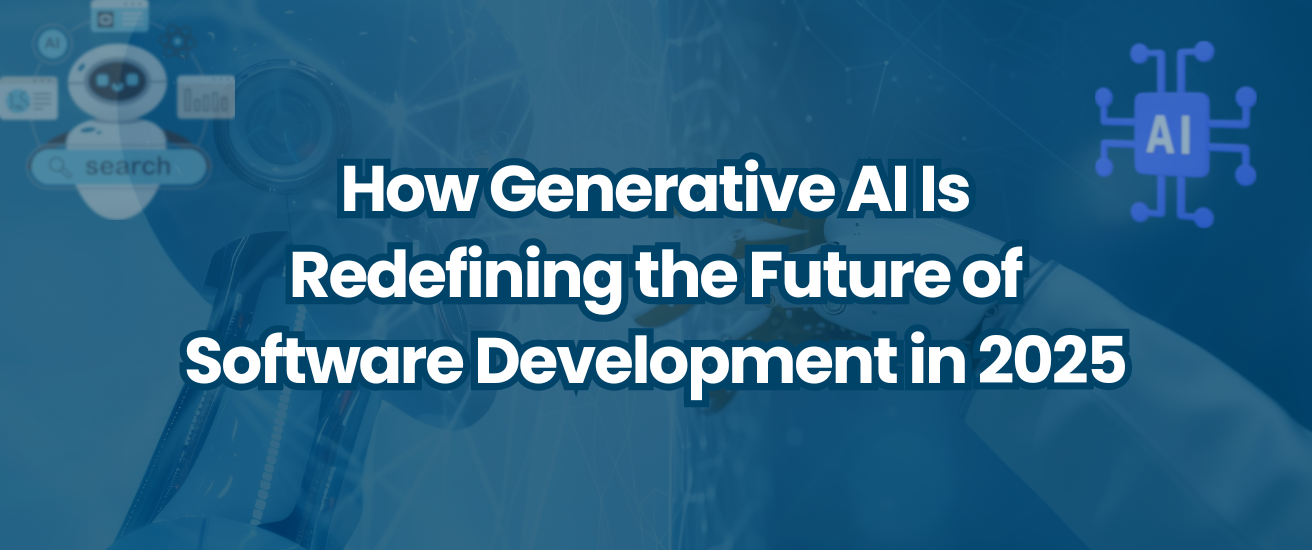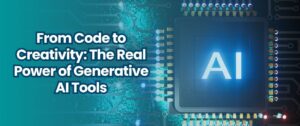How Generative AI Is Redefining the Future of Software Development in 2025

Software development is evolving faster than ever before. In 2025, Generative AI is not just enhancing the development process—it’s redefining how software is conceived, built, and maintained. What once took months of manual coding can now be done in days, thanks to intelligent automation powered by AI. Companies like Codeed Inc. are at the forefront of this revolution, integrating Generative AI into modern development workflows to create efficient, scalable, and intelligent software solutions.
Understanding Generative AI

What Makes Generative AI Unique
Generative AI goes beyond traditional automation. It uses advanced machine learning models—like large language models (LLMs)—to generate human-like code, content, and designs. It’s capable of understanding complex requirements, writing functional code, and even suggesting architectural solutions.
Evolution of AI in Software Development
AI has been part of software development for years—through testing automation, analytics, and prediction tools. However, the 2025 iteration of Generative AI integrates creativity with logic. Instead of being a support tool, it now acts as a co-developer, capable of ideation, prototyping, and iterative improvement.
Generative AI in 2025: The Turning Point
The year 2025 marks a technological tipping point where Generative AI becomes an essential part of mainstream software development. Developers now collaborate with AI agents capable of writing code, debugging, and learning continuously. From startups to global enterprises, every organization is exploring how to embed AI into its core software ecosystem.
How Generative AI is Transforming Software Development
Automating Code Generation
Generative AI tools like GitHub Copilot, CodeWhisperer, and custom-built solutions from companies such as Codeed Inc. are making code generation almost instant. Developers simply describe functionality in natural language, and AI generates efficient, clean, and testable code in seconds.
Enhancing Software Design and Prototyping
Gone are the days of lengthy UI/UX design processes. Generative AI models can analyze user needs and automatically produce wireframes, layouts, and prototypes. This speeds up development cycles and enhances creativity through AI-assisted ideation.
Smarter Debugging and Testing
AI-powered debugging systems identify bugs before deployment, recommend fixes, and even rewrite faulty sections. Predictive analytics ensure better code stability and performance, drastically reducing post-launch errors.
AI-Assisted Development Environments
Modern IDEs are being transformed into AI-powered workspaces. They offer real-time code suggestions, optimize syntax, and ensure coding standards—making software development faster, more collaborative, and error-free.
Personalization Through Generative AI
Generative AI personalizes software solutions like never before. It learns from user data, adapts interfaces, and tailors application workflows to meet unique customer needs. This means products developed in 2025 are not just functional—they’re intelligent and adaptive.
Accelerating MVP and Product Development
With AI handling routine tasks, companies can focus on innovation. Minimum Viable Products (MVPs) that once took months to develop can now be ready in weeks. This agility helps businesses test faster, scale quicker, and launch smarter.
Generative AI and Cloud Integration
Cloud computing and Generative AI form a powerful synergy. Cloud-based AI tools allow developers to train, deploy, and scale applications seamlessly. Codeed Inc. leverages this integration to deliver scalable, AI-driven cloud solutions that maximize efficiency and performance.
Improving Efficiency and Reducing Costs
Generative AI automates repetitive coding, reduces testing overhead, and minimizes the need for large development teams. The result? Lower operational costs and faster time-to-market, without compromising on quality or innovation.
Generative AI in Agile and DevOps Workflows
In Agile and DevOps, Generative AI acts as an intelligent assistant, optimizing sprint planning, predicting delivery timelines, and automating documentation. This creates a smooth, data-driven development environment where every process is optimized through AI insights.
The Role of Generative AI in Security and Compliance
AI algorithms are now capable of scanning codebases in real time to detect vulnerabilities, ensure compliance, and suggest improvements. With cyber threats increasing, this proactive AI-based protection helps maintain secure and compliant software ecosystems.
Challenges and Ethical Considerations
Despite its advantages, Generative AI poses challenges—data bias, IP ownership, and dependency risks. Developers must ensure responsible AI usage, maintaining human oversight and ethical standards in every phase of development.
Generative AI and the Developer’s Role
Far from replacing developers, Generative AI empowers them. It handles repetitive tasks, allowing professionals to focus on creative problem-solving and high-level architecture. Developers now become AI strategists, guiding intelligent systems toward optimal outcomes.
How Codeed Inc. is Leading the AI Revolution
At Codeed Inc., Generative AI isn’t just a trend—it’s a mission. The company integrates AI-driven technologies across development services, from custom web and mobile apps to AI-powered cloud solutions. By merging human expertise with AI intelligence, Codeed delivers futuristic, data-driven, and high-performing digital products tailored to client goals.
The Future of Generative AI in Software Development
The future is AI-augmented development—where creativity, speed, and intelligence converge. As models continue to evolve, developers will rely on AI for real-time innovation. The synergy of human intuition and machine precision will define software development for decades to come.
Conclusion
Generative AI is not just changing software development—it’s redefining its foundation. The industry’s focus is shifting from coding to creating intelligent, adaptive systems that can think, learn, and improve. In 2025, success belongs to those who embrace this transformation early. Codeed Inc. stands ready to lead that future, building the bridge between human creativity and machine intelligence.
Call to Action
Want to build smarter, faster, and AI-powered solutions?
Partner with Codeed Inc. today — and experience how Generative AI can transform your next software project.
Visit www.codeedinc.com to get started.
FAQs
Q1. What is Generative AI in software development?
Generative AI uses machine learning models to automatically create code, designs, and documentation, streamlining the software development process.
Q2. How is Generative AI transforming coding in 2025?
AI now assists in real-time coding, debugging, and optimization—allowing developers to focus on innovation rather than repetitive tasks.
Q3. Will Generative AI replace developers?
No. Instead of replacing developers, Generative AI enhances their capabilities by automating routine tasks and improving productivity.
Q4. What are the benefits of integrating Generative AI in development?
Key benefits include faster development cycles, reduced costs, higher accuracy, better code quality, and personalized user experiences.
Q5. How is Codeed Inc. leveraging Generative AI?
Codeed Inc. integrates Generative AI across its services—helping businesses develop scalable, intelligent, and future-ready software solutions.
Table of Content
 5.0
5.0
Unlock your new design team today
Get a team of skilled professionals and all the benefits that come with top-grade in-house designers—for a flat fee.
Book a free call


